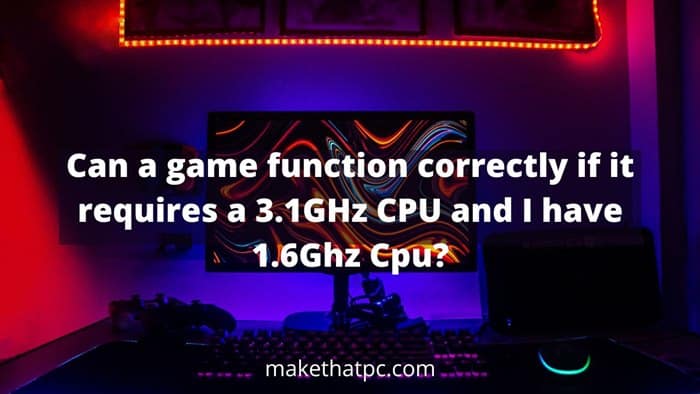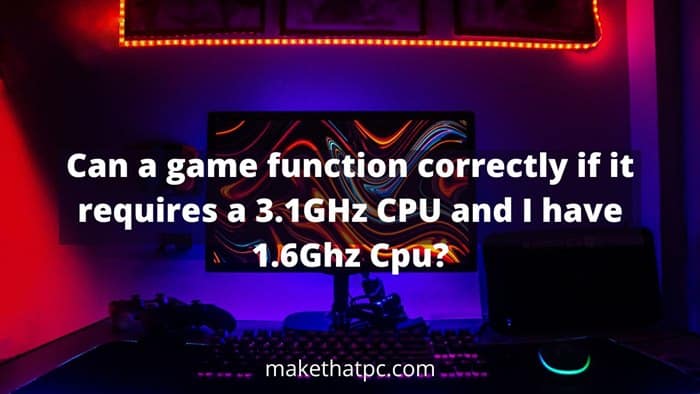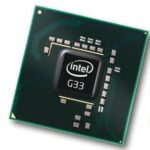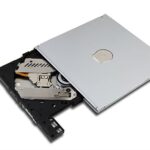Gaming has become more or less a kind of a 9 to 5 job for professionals. Yes, we’re talking about the pro esports players and game streamers who make a living through competitive gaming. Owing to that, the onset of more powerful processors and stronger hardware setup has also tantalized us with its essence.
With that said, there’s a stream of never-ending questions that clouds our mind about what is the best to fulfill our needs. If we speak about CPU frequencies, a lot of technicalities come into play. There Is so much information on every nook and cranny of the internet that we often feel lost. In the end, we are still stuck with our queries.
To answer your question in simple words, it is going to be nearly impossible to play games that need a 3.1 GHz CPU but your CPU just has 1.6 GHz Frequency. However, you can expect some performance with a 2.5 GHz CPU along with a fast RAM and storage. 1.6 GHz is pretty low CPU frequency to handle games.
For example, a 3.2 GHz CPU is recommended to get the most out of GTA-V. But, minimum required is 2.50 GHz CPU. Below this will cause numerous issues while gaming. Let’s talk some more about it.

What does GHz mean?
GHz which is short for GigaHertz is a unit used for measuring AC that is, alternating current. Hertz is usually a unit for measuring the frequency of sound or electrical impulse. But in the case of computers, it is generally referred to as clock speed or clock rate.
By this, you can measure the number of cycles your CPU executes per second. These cycles are usually measured by a pulse synchronized by an internal oscillator which gets more technical further. To keep things simple, it is better to say that GHz is the number of cycles a CPU completes in a second.
Now, a 3.1GHz CPU means that the CPU conducts 3.1billion cycles per second. This usually is a good speed for most gamers, as almost 95% of the hi-end games can run well on this clock speed.
Though earlier when computers were newly introduced, they were measured in KHz, or kilohertz as they were not that efficient. A higher Frequency CPU usually means that it functions better. For the record, the very first processor, the Intel 4004 operated at around 750 kHz. The next-generation computers could run at MHz like the Intel Pentium processor was available at speeds of 70 MHz to 250 MHz approximately.
Fast forward to 2022, we now have the luxury to experience CPUs that work with GHz, which means they complete billions of cycles in one second, faster than we can ever imagine. Yes, we have come this far!
How does CPU matter in computer functioning?
Well, the CPU or the Central Processing Unit is more like the brain of a computer. It sits in a socket on your PC’s motherboard and regulates almost all the work you assign to your computer. Every input you register on to your system via a keyboard or a mouse, or anything in such a case, goes straight through the CPU and then to the other components.
For that reason, having a fast-running CPU is the need of the hour in case you are wondering why your computer fails to perform at optimum functionalities. Thanks to the development of CPUs over time, we are now able to stream and edit 4K videos, and play heavy graphic intensive games rather than just rocking with solitaire or scrolling through still images.
How is clock speed related to gaming?
As I discussed earlier, the overall functioning of your computer is primarily on the CPU. But, it Is crucial for you to note that the role of CPU is predominant in order to offer you a hassle-free gaming spree.
With that said, does the amount of GHz affect gaming? Yes, it does to some extent. Now this brings us to the cores and threads and how it affects a gaming performance.
What are cores and threads?
To kick things off, cores are a real physical thing present on your CPU. On the other hand, threads are virtual. In bookish terms, a core is defined as a physical component or part that is present on the CPU, which regulates the speed at which the CPU can execute instructions. So, to break it to you, more cores simply mean higher speed ad performance.
Now, threads are a virtual component present inside the cores that allows multiple activities within a single process going on at a time. Thread is like a managing system that divides and organizes all the workload to be operated by the core.
For instance, when we hear that a specific computer is a Quad-core with 8 threads, it usually means that it contains 4 cores while 8 threads can function parallelly. If by any chance, a core fails to meet a certain expectation, the task can jump on to the next and the work will be handled without any lag. Quite fascinating, isn’t it?
Whenever we speak of games, visuals and graphics seem to be the main concern. With this, GPU or the Graphics Processing Unit comes into play. As the name suggests, it helps in regulating all the data related to graphics and visuals in a game. So, is it the GPU that matters after all? Let’s find out…
GPU vs CPU in case of games
I assume you already know the importance of GPU as hi-end gaming is one heck of a graphics-intensive task. With that said, if your CPU fails to handle the workload, the GPU is of no use. It is like assigning a 10th grade project to a 6th standard student!
Now, in case you are confused as to where to invest more, consider the CPU as a clear ground that will let the other players play well.
Now, let’s address the elephant in the room….
Can we play a 3.1GHz CPU requiring game, and play well on a 1.6GHz CPU? Final Verdict
Right off the bat, a small change in CPU clock rate exponentially affects the efficiency. For instance, tweaking up from 3.2GHz to 3.4GHz is a 6.25% increase in gaming performance. This means, there seems to be a huge gap between the 1.6GHz supporting CPU and the 3.1GHz requirement of the game. To put it simply, the game will run but will not yield satisfactory results. It will only let the game play at, say 2/3rd or ½ the usual gaming speed. The visuals may lag, the fluidity of the game may be lost and so may your tolerance as a whole.
The final verdict is , YES it will run the game, but NO it will not be playable. So, consider investing in a more powerful CPU rather than just investing haywire to construct a good gaming setup. Hope I could feed your curiosity by answering all your queries in the simplest way possible. Thanks for sticking around!

I am Anshul Rana, an experienced author specializing in PC gear reviews and Windows 10 software tutorials. With a strong passion for technology and an in-depth understanding of the PC industry, I provide insightful and detailed analyses of computer peripherals, gaming gear, and software solutions. My writing style is concise yet informative, making complex topics accessible to both beginners and advanced users. Through my reviews and tutorials, I aim to offer valuable guidance, helping readers make informed decisions to enhance their PC experience and explore the vast possibilities of Windows 10 software.










